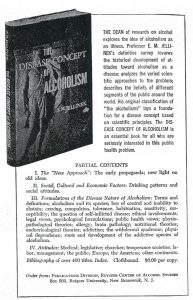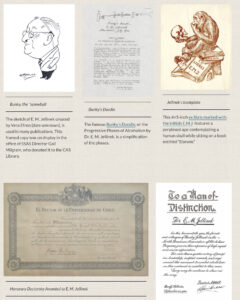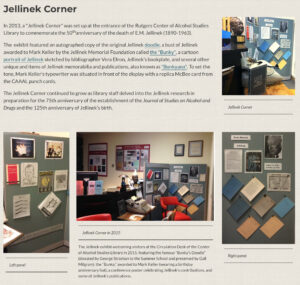 As announced last month, the Alcohol Studies Archives Exhibit was soft-launched and added to the RU Libraries Digital Exhibits page. The current, updated version features 51 pages with 403 images and 101 documents, with many links to related items in RUcore’s Alcohol Studies Collection.
As announced last month, the Alcohol Studies Archives Exhibit was soft-launched and added to the RU Libraries Digital Exhibits page. The current, updated version features 51 pages with 403 images and 101 documents, with many links to related items in RUcore’s Alcohol Studies Collection.
The Rutgers Center of Alcohol and Substance Use Studies owes much of its identity to Elvin Morton “Bunky” Jellinek, whose legacy is captured in the exhibit section titled We Remember Jellinek! These pages bring together reflections and tributes that reveal not just the scientist behind the disease concept of alcoholism, but also the man who influenced generations with his intellect, curiosity, and dedication. Described as “the Renaissance Man who brought alcohol studies out of the Dark Ages” by Dr. Thomas Babor, Editor-in-Chief of the Journal of Studies on Alcohol and Drugs (2015-2023), Jellinek will continue to inspire both the field and broad audiences through this exhibition.
We Remember Jellinek: The Man Behind
The Alcohol Studies Collection at Rutgers pays tribute to many pioneers in the field, but few loom as large as Elvin Morton Jellinek. The exhibit called We Remember Jellinek! adds key components to a yet-to-be-written Jellinek-biography. Presenting a vibrant portrait composed of publication highlights, memories, letters, photos, and reflections, these testimonies reveal a brilliant scholar who fundamentally shaped the field of alcohol studies.
 More Than a Name in the Literature
More Than a Name in the Literature
Anyone familiar with addiction studies knows the name Jellinek. He made a profound impact in science and society: his contributions laid the foundation for how alcoholism is understood and treated today. He was instrumental in introducing the disease model of alcoholism, and his work at Yale, continued by his successors later at Rutgers, helped establish the scientific legitimacy of the field.
The exhibit aims to go beyond his professional achievements, inviting the public to know Jellinek (or “Bunky,” as he liked to be addressed) not just as a scholar, but also as a global thinker and a mentor, whose unforgettable presence created a lasting impression in the lives of his colleagues and beyond, us included. Through firsthand accounts, visitors learn what it was like to work alongside him, to be challenged by his intellect, and to be inspired by his encouragement.
A Lifelong Learner and Global Thinker
Jellinek’s intellectual curiosity knew no boundaries (literally and figuratively). As reflected in the memories collected here, he was just as interested in linguistics, anthropology, and mythology as he was in statistics or psychiatry. He brought this broad perspective into every discussion, encouraging interdisciplinary research long before it became fashionable.
His global outlook was not just academic—it was personal and practical. Fluent in several languages and familiar with diverse cultures, Jellinek managed to bring international perspectives into the study of alcoholism. Throughout his entire life, he traveled widely, engaged with scholars across continents, and advocated for culturally sensitive approaches to addiction research. His correspondence preserved in the Keller Papers of the CAS archives is a testament to his wide-reaching impact and efforts to bridge disciplines and borders.
 The Personal Touch: Stories That Stay With Us
The Personal Touch: Stories That Stay With Us
In addition to the “Bunkyana,” as we the curators call any artifact related to “Bunky,” the exhibit is a mosaic of memories, gathered from colleagues, mentees, and admirers who crossed paths with Jellinek during his time at Yale and beyond. It presents an engaging collection of personal stories, giving life to the man behind the monumental ideas through the lens of his peers as well as CAS Library staff, who recently contributed to the Jellinek research. Through their voices, readers get a human portrait of Jellinek: his multilingual brilliance, his encyclopedic memory, and his unique ability to connect across cultures and disciplines.
A Lasting Legacy
Jellinek passed away in 1963, but his presence is still felt—not only throughout the field of alcohol studies but in the language, calling a staple educational tool at substance abuse treatment centers derived from his phases of progression of alcoholism the “Jellinek Curve.” His work remains foundational, but his legacy endures in a deeper sense—through the generations of researchers he mentored, the international networks he helped build, and the intellectual rigor he represented.
The images included in this exhibit page, such as group photos and handwritten notes, tell us his story. However, the memories are not mere nostalgia—they help us understand the culture of inquiry, collaboration, and courage to start something new. The exhibit makes clear that Jellinek’s influence wasn’t limited to scholarly articles and books; it lived on in the way his colleagues thought, taught, and conducted research.
 Why We Remember
Why We Remember
There is something intriguing about remembering a person through the memories of those who knew them as shown in our interview with the late Harold Kalant, whose office used to be next to Jellinek’s in Toronto over 60 years ago. We Remember Jellinek! doesn’t just tell us what Jellinek did; it gives us an idea who he was: an enigmatic, brilliant scholar, whose life, in parts, remains a mystery, probably for ever.
The exhibit is more than a tribute—it is a reminder that the work of science is ultimately the work of people. Jellinek’s intellectual curiosity, wide-ranging expertise, and collaborative spirit continue to shape alcohol studies research. The exhibit preserves that influence for new generations, inviting scholars and visitors alike to remember not only what Jellinek did, but who he was.
Explore We Remember Jellinek!
Whether you are a scholar, a student, or simply someone interested in the human side of scientific progress, this tribute to E.M. Jellinek offers valuable insights—and inspiration. Explore We Remember Jellinek! to meet the man behind the science—through the eyes of those who knew him best.

Highlighting Jellinek’s work at the SALIS conference in 2014 at Rutgers, which became the source of our contributions to the Wikipedia entry about Jellinek.